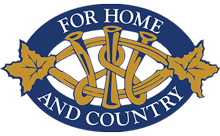Provincial Initiatives
Lyme Disease
Lyme Disease has become a growing health crisis in Canada. Unfortunately, the disease is difficult to diagnose in this country, with more education, proper screening and funding desperately needed to ensure that people do not have to suffer unnecessarily with a misdiagnosis. When left undetected, the damage can be irreversible and potentially life-threatening.
Since 2016, FWIO has expressed concern regarding the lack of action being taken on the control and treatment of Lyme Disease. Together with the Federated Women's Institutes of Canada, FWIO has urged the Government of Canada to form a coalition to institute a Federal framework in which to create comprehensive measures dealing with the diagnosis and the significant health issues caused by Lyme Disease.
In the meantime, WI Members across Ontario have been supporting Lyme Disease research and education through donations to the G. Magnotta Lyme Disease Research Lab at the University of Guelph, and hosting ROSE Sessions (educational programs) for their communities.
If you are looking for additional resources on Lyme Disease, please use the links below:
- G. Magnotta Foundation
- Canadian Lyme Disease Foundation
- Lyme Ontario
- Ontario Lyme Alliance
- Public Health Ontario
FWIO Letter to the Minister of Health and Long-Term Care Regarding Lyme Disease - March 2019 (PDF)
Human Sex Trafficking
Many branches have been involved in raising awareness of sex trafficking in their communities. Human sex trafficking is a serious issue in Ontario, where vulnerable individuals, especially women and children, are often lured or forced into the commercial sex trade. The prevalence of human trafficking is driven by several factors, including poverty, homelessness, addiction, and a lack of access to education and employment opportunities. The traffickers often use violence, threats, and manipulation to control their victims and keep them in the trade.
Ontario is one of the highest-risk regions in Canada for human trafficking. According to a report by the Ontario government, the majority of trafficking victims in the province are Canadian citizens, and a significant number are under the age of 18. In an effort to prevent human trafficking, the government of Ontario has taken steps to raise awareness about the issue and improve the response of law enforcement and service providers. For example, the province has implemented a human trafficking awareness campaign, which includes public education and training for frontline workers and law enforcement. A human trafficking enforcement team has been established and funding is available to organizations that provide support and services to trafficking victims.
Ontario passed legislation in 2021 to increase penalties for human traffickers and provide support and protection to victims. The province has also established a human trafficking hotline and has established partnerships with organizations and communities to provide education, awareness, and support to those affected by human trafficking. WI members can support this work by partnering with local agencies like the Ontario Provincial Police and Crime Stoppers to book a speaker for a community event.
Members can also be vigilant: If you suspect someone is being trafficked, call 911 or your local police service. If you know someone in need of support, or want to report a potential case, call the Canadian human trafficking hotline: 1-833-900-1010. It is confidential, too-free, and open 24/7.
